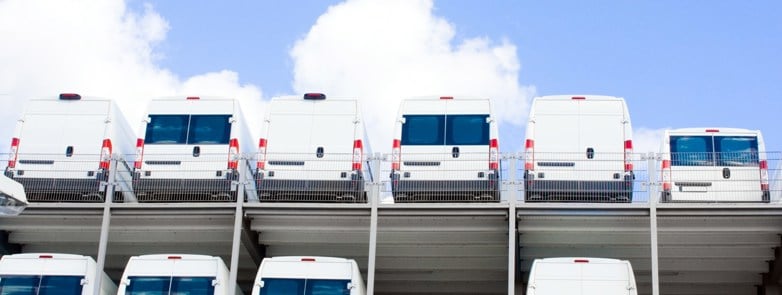Van Leasing vs Buying
Here at Nationwide Vehicle Contracts, we understand that choosing a new van is an important decision for any business.
Alongside make, model, engine size and load capacity, how you will fund your new vehicle is equally important. Many businesses are now turning to van leasing as a viable and alternative funding solution to buying the van outright but which option is right for your business?
To help you understand the differences between buying or leasing your next new van, Nationwide Vehicle Contracts has put together a short guide to explain the pros and cons of both funding options.

Before we look at the benefits and drawbacks of buying vs leasing, it is important to understand the differences between both funding options.
Buying a van
Buying a van is when an individual or a business decides to purchase the vehicle outright (e.g. with cash) or via a bank loan. When you choose to buy a van outright, you own the vehicle, leaving you free to use the vehicle without any contract restrictions. You are also responsible for selling or disposing of the vehicle when it is no longer required.
Leasing a van
Leasing a van offers an alternative funding solution to buy the vehicle outright. With a lease deal, the customer pays a fixed monthly price for the exclusive use of the van for a set period of time. At the end of the lease agreement, the van is returned to the finance provider. With a lease deal, you do not own the vehicle but any worries about depreciation values or disposal are left to the finance provider as they are the registered owner and keeper of the vehicle.
“If you're unsure whether to buy or lease a van, consider your financial situation, how long you plan to keep the vehicle and the importance of ownership. These will all help guide your decision as to which option is best for you.”

Buying a van offers many advantages including:
Pros:
- Freedom of ownership – Buying a van brings more freedom as the vehicle belongs to you. If you need to trade, sell or swap the vehicle, you can do so whenever you want
- No mileage restrictions – When you buy a van, you are not restricted to a mileage limit and the associated maintenance costs surrounding this
- Maintain the van to your standards – As you own the van, you can be as rough or demanding on your vehicle without having to pay any penalties
- No additional payments – When you buy a van outright, you have no additional payments to consider, making it easy to budget over a long period
- Capital allowances – You can also claim capital allowances against the purchase of a van (if the van is used for business purposes only), helping to lower your income tax bill. Further information is available on the Gov.uk website
Cons:
Buying a van also brings its own disadvantages, including:
- High initial outlay - In most cases, you will need to save up for a large deposit or have access to significant funds in order to purchase the vehicle
- Depreciation costs - According to Parkers, a new van loses an average of £14,000 in residual value in its first three years, making depreciation a key drawback of purchasing a new van outright
- Costly repairs – The older the van gets, the more likely you are to experience costly maintenance and repair bills, particularly after the warranty expires
- Disposal hassles – When you own a van, you are responsible for disposal or re-sale of the vehicle, which can both costly and time consuming
Leasing a van: The pros and cons
There are many advantages to leasing a van, including:
Pros:
- Fixed monthly rentals – With a lease deal, you know exactly how much you have to pay each month, making budgeting easier. The initial rental is also usually around 3 x the monthly payment, meaning you don’t have to save up for a huge deposit
- Drive a brand new van – If you like the idea of driving a brand new van every two or three years then leasing is worth considering. At the end of your lease agreement, you simply return the van and walk away, or opt to take out a new van on a new agreement
- No depreciation costs – With a lease deal, you only pay to use the vehicle for a set period of time so you don’t need to worry about total depreciation costs
- Optional maintenance packages – If you choose to add a maintenance package to your lease agreement, full cover is included for routine servicing, maintenance and tyre replacements
- No ownership risks - Leasing removes depreciating assets from your company’s balance sheet and the associated risks of owning the van, such as depreciation and disposing of the vehicle
Cons:
Leasing a van also brings its own disadvantages, including:
- Wear and tear - At the end of your lease, your van will be inspected for fair wear and tear. Any damage that falls outside the funder’s guidelines will be subject to excess damage charges
- Ownership – With a van contract hire agreement, you will never own the vehicle as there is no option to buy it
- Credit history – Most funders ask for a good to excellent credit score in order to be approved for van leasing finance so if you or your business has a poor credit history, you may not be eligible for van leasing
- Mileage limitations - If you exceed the agreed annual mileage, you will be liable for excess mileage charges at the end of your contract which is charged at a pence per mile (PPM) rate
- Modification restrictions – While some small and reversible modifications may be permitted by the funder (e.g. such as sign writing the vehicle), others may not be allowed
Looking to lease a brand new van? Check out our van lease deals for our latest offers.
Guide Information
Originally published: 19th October 2016
Last updated: 24th August 2022
